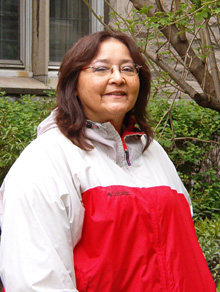
Linda David Cree challenges stereotypical images

Linda David Cree
Photo by Lina Shoumarova
Through her master’s thesis, Linda David Cree revisited Canadian and Quebec history as it is taught in schools, and challenged deep-seated stereotypes of indigenous people.
Linda remembers feeling hurt by the way her ancestors were spoken of in elementary and secondary school.
“I was made to feel ashamed of my own people, who were portrayed as constantly warring, savage man-beasts. They were not considered human beings, or they were invisible and silenced,” she said in an email interview.
After completing with distinction her bachelor’s degree in social work at Ottawa’s Carleton University, Linda chose educational studies. She wanted to “understand the underpinnings of education from a Western point of view” and then compare them to indigenous worldviews.
For her thesis, entitled “Would you like to hear a story? Mohawk youth narrative on the role of the history of Quebec and Canada on indigenous identity and marginality,” Linda worked with students in Kanehsatake, the Mohawk community southwest of Montreal.
She interviewed the students about their perceptions and attitudes towards the history lessons they received in school. In particular, she looked at the textbook Diverse Pasts: The History of Quebec and Canada, created by the Quebec Ministry of Education.
Clan system
She also spoke with teachers and conducted classroom observations. In order to protect the identities of her subjects, Linda used the Clan system — Bear, Wolf and Turtle — to identify individuals.
The Clans identified with their history and government, “but they also recognized that in current history texts, indigenous peoples are still voiceless, cemented in the past, and marginalized.”
Linda successfully combined her thesis preparation with her work for the National Aboriginal Health Organization, a body run by indigenous people to promote health issues and research in their own communities. She still works there, and is considering whether to continue towards a PhD.
She has happy memories of her studies at Concordia. “The professors took an interest in me as a human being. I overcame several personal obstacles with their kind understanding.”
Linda says a special thank-you to her thesis supervisor, Ailie Cleghorn, “who encouraged me to write and interpret as I see the world, with indigenous eyes.”
-Lina Shoumarova